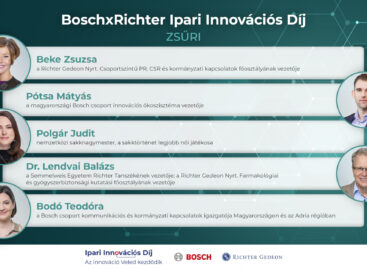STEM-interested Gen Z youth enter the workforce with strong ideas, new research finds
Self-assertion, work environment, financial resources, social relationships, creativity and intellectual stimulation are the main work values that are decisive for Generation Z young people entering STEM careers in choosing their future jobs and staying there, according to a recent, national, representative study by career guidance specialist Lilla Becsei, which was conducted in cooperation with the Together for the Future Engineers Association among 12th grade Hungarian students.[1] The survey also shows that boys are more interested in technical further education opportunities, despite the fact that girls’ mathematics results are generally better than those of the two sexes. The latter, on the other hand, prefer health-care programs over STEM, building on their strong natural science knowledge, when choosing a higher education institution.
“It is important to see how young people leaving technical higher education and starting their careers can be most effectively integrated into the world of work in companies. Lilla Becsei’s research, completed in cooperation with the Hungarian Association of Engineers, provides clues for this. It shows that in addition to providing appropriate material conditions, they prefer an environment and workplace conditions where their own insights can be validated, their creativity can soar, and they receive support and encouragement from their managers and colleagues in solving their tasks. These are work values that also represent the foundations of long-term cooperation for companies.”
– stated Dr. László Ábrahám, President of the Together for the Engineers of the Future Association.
At the same time, the expert considers it a welcome fact that the workplace environment of new entrants must be agreed with young people. According to the head of the Association, both industry and higher education must urgently respond to the findings of the research, which shows that STEM careers are less attractive among 12th graders. The reasons are manifold. In addition to the opportunities that can be grasped through academic results and the transformation of interests, many life events can also influence the career choice decision, such as changes in the family (divorce, moving, etc.). There is a noticeable decline among girls in particular, which is explained, among other things, by the fact that they encounter few female engineers in their narrower and wider environment. Due to the lack of role models, they do not consider a technical career themselves; they are much more attracted to higher health education, including medical and pharmaceutical programs, based on their excellent grades in natural science subjects.
The President of the EJMSZ noted that Lilla Becsei’s gap-filling research gives a clear signal to both industry and educational institution representatives, as well as decision-makers, that initiatives supporting technical career guidance need to be stepped up. Accordingly, the Association will continue to organize factory visits so that young people can meet real engineers and technical professionals and learn about the benefits, beauties, and main characteristics of these professions through them. This program is one of the most popular among their students, which is well indicated by the fact that over the past 10 years, several thousand students have been taken to their member organizations for factory visits.
Related news
Related news
Nestlé to sell remaining ice-cream assets but commits to Froneri venture
🎧 Hallgasd a cikket: Lejátszás Szünet Folytatás Leállítás Nyelv: Auto…
Read more >Lidl guarantees fairer prices for cocoa farmers
🎧 Hallgasd a cikket: Lejátszás Szünet Folytatás Leállítás Nyelv: Auto…
Read more >









